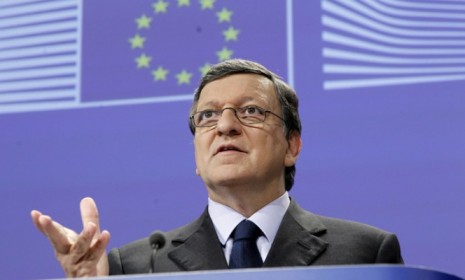Did the U.S. cause the European debt crisis?
A top European leader implies that American banks are responsible for the euro's current woes, reflecting deep divisions among the world's leading economies

A free daily email with the biggest news stories of the day – and the best features from TheWeek.com
You are now subscribed
Your newsletter sign-up was successful
Debt-saddled Europe may be staring into the abyss, but there's apparently still time for a little trans-Atlantic smack-talking. This week, Jose Manuel Barroso, the president of the European Union's political arm, lashed out at critics of Europe, and pointed a finger at the U.S. "This crisis was not originated in Europe," he claimed. "This crisis originated in North America and much of our financial sector was contaminated by, how can I put it, unorthodox practices from some sectors of the financial market." Barroso's claim drew strong objections from investors and economists, some of whom called his remarks "foolish." But does Barroso have a point?
No. Barroso's comments are highly worrisome: The main problem with Barroso's remarks is "that unless you identify the cause of a problem correctly, you've no real hope of being able to solve said problem," says Tim Worstall at Forbes. Wall Street didn't saturate Spain's banks with toxic loans, nor cause Greece to accumulate a ton of debt. The fact that a senior European leader could be so "deluded about the real world" suggests that Europe will never be able to "plot a way out of this mess."
"Eurozone crisis: Barroso says a big boy did it then ran away"
The Week
Escape your echo chamber. Get the facts behind the news, plus analysis from multiple perspectives.

Sign up for The Week's Free Newsletters
From our morning news briefing to a weekly Good News Newsletter, get the best of The Week delivered directly to your inbox.
From our morning news briefing to a weekly Good News Newsletter, get the best of The Week delivered directly to your inbox.
But the two crises are connected...: The European debt crisis is essentially an extension of America's 2008 financial crisis, but "chronology is not causality," says Ambrose Evans-Pritchard at Britain's The Telegraph. The U.S. financial crisis was the first indication that a global credit bubble, decades in the making, was about to pop. It merely "happened to detonate first in the U.S. because the American business cycle was a few months ahead." But the cause of the bubble was that banks and countries borrowed far too much — and in that respect, Europe is as guilty as anyone else.
"Mr. Barroso, Europe's crisis has nothing to do with America"
Barroso's outburst shows that the world is divided: Barroso's comments came during a Group of 20 summit in Los Cabos, Mexico, that was intended to produce a consensus on how to stabilize the global economy, says Carsten Volkery at Germany's Der Spiegel. Instead, his outburst underscored the fact that the world can't even agree on how the crisis began. European leaders "are becoming increasingly allergic to advice from abroad," squashing hopes that the G-20 could come together to tackle a crisis that is increasingly taking on global proportions.
"Eurozone leaders tired of criticism from abroad"
A free daily email with the biggest news stories of the day – and the best features from TheWeek.com
-
 Film reviews: ‘Send Help’ and ‘Private Life’
Film reviews: ‘Send Help’ and ‘Private Life’Feature An office doormat is stranded alone with her awful boss and a frazzled therapist turns amateur murder investigator
-
 Movies to watch in February
Movies to watch in Februarythe week recommends Time travelers, multiverse hoppers and an Iraqi parable highlight this month’s offerings during the depths of winter
-
 ICE’s facial scanning is the tip of the surveillance iceberg
ICE’s facial scanning is the tip of the surveillance icebergIN THE SPOTLIGHT Federal troops are increasingly turning to high-tech tracking tools that push the boundaries of personal privacy